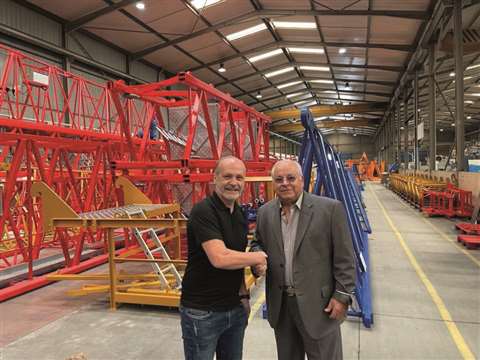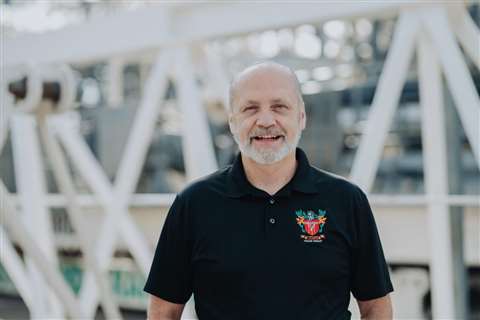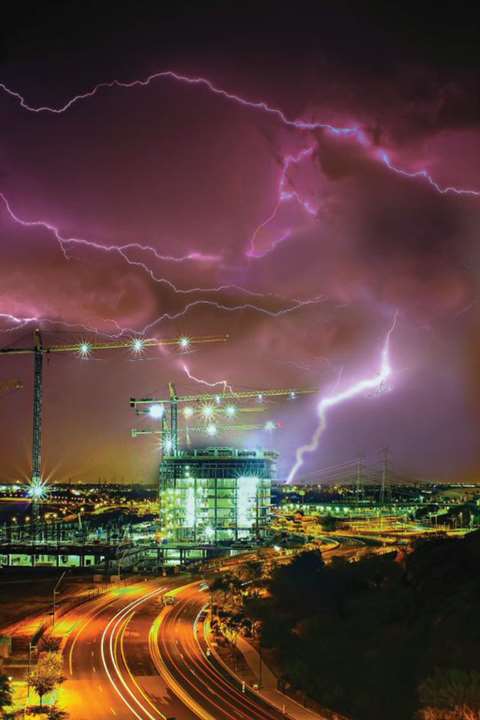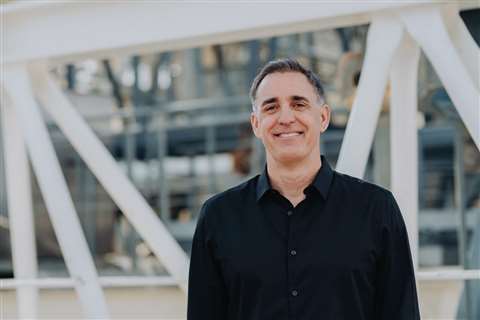Stafford Crane Group: Acquisitions, family values and beyond
19 November 2021
An interview with Patrick N Stafford, Stafford Crane Group CEO, had been in the works for some time before an acquisition by this specialist crane business finally precipitated action. Alex Dahm reports
By the time you read this you may well have already seen the news that Portuguese tower crane manufacturer Soima is the latest addition to an expanding Stafford Crane Group (SCG) portfolio (ICST October 2021 news). Alex Dahm got the full story from Patrick Stafford, SCG founder.
 Stafford Crane Group founder Patrick Stafford and Soima Cranes founder Manuel Morais shake on the deal for Stafford’s 100 per cent acquisition of the Portuguese tower manufacturer in September 2021
Stafford Crane Group founder Patrick Stafford and Soima Cranes founder Manuel Morais shake on the deal for Stafford’s 100 per cent acquisition of the Portuguese tower manufacturer in September 2021
Going back to the beginning, the group was founded in 2004 in Phoenix, Arizona, USA, to provide tower crane rentals. Stafford takes up the story, “Since then, we have started or acquired several other business lines. In 2006 we began the Tower Crane School of Phoenix which trains students to be crane operators and attain their NCCCO certifications. In 2013 we started Stafford Mobile Cranes which supports our tower crane operations and provides third-party mobile crane services.
“And most recently – something I am personally very excited about at the moment – we entered the tower crane manufacturing space by acquiring Soima Cranes of Portugal, which really helps take our operations to the next level. Through the years we have worked all over the world, including in Ireland, Dubai, Guam, Peru, Mexico, Brazil and, of course, in the United States, where we started. To this day, I am still very hands on in crane operations, and I am always exploring new business opportunities within the industry.”
ICST: How have you built a successful tower crane rental business?
PS: Like in all industries, we believe the way to build a successful crane business is by providing the best customer service and ensuring new and returning customers are always satisfied. However, while it is easy to say customer satisfaction is key, it is difficult to achieve. At Stafford Crane Group we achieve customer satisfaction primarily by being readily available to our customers, communicating continuously with them and providing them the highest quality equipment and services.
 “We are not only good at what we do but every day we endeavour to be people of good moral standards,” says Patrick Stafford
“We are not only good at what we do but every day we endeavour to be people of good moral standards,” says Patrick Stafford
Even as the owner of the company, I will answer customer calls at any time, day or night. My personal phone number is listed on our cranes, trucks and on our website. If a customer comes to us with an issue, we will find a solution for them as soon as possible, so they are not anxiously waiting. Many large, segmented companies have many layers of decision making so they find it challenging to communicate with customers quickly. Because we are a family-operated organisation with minimal levels of management, we can typically provide accurate responses much faster than our competitors.
What are the different sectors of your business and how does that help your company overall?
The other secret to building a successful crane company for us has been expanding our services to take control of all aspects of the customer experience. When we started Stafford Crane Group we only bare-rented tower cranes, but we quickly found that the third parties we relied on for incidental services inevitably disappointed us and prevented us from delivering excellent customer service. Some companies would provide broken machinery with little urgency to repair, others wouldn’t deliver on time, etc. We knew we could do it better, so we’ve brought it all in-house.
We started out by purchasing our own mobile cranes to erect and dismantle our tower cranes. Then we added our own fleet of semi-trucks and trailers to be able to move the equipment around the country to meet our customers’ schedules. Stafford Crane Group now also offers engineering services to the tower crane industry and a premier crane school to train operators for both our own use and our customers.
 Some readers may remember this spectacular photo of Stafford cranes on the front cover of the September 2014 issue of International Cranes and Specialized Transport
Some readers may remember this spectacular photo of Stafford cranes on the front cover of the September 2014 issue of International Cranes and Specialized Transport
The most recent step has been acquiring Soima Cranes. This enables us to control even the design and supply of the equipment. Additionally and critically, it enables us to stock replacement parts in the United States to ensure the inevitable breakdowns are repaired as quickly as possible for our customers. Everyone in the US construction industry will tell you there is nothing more frustrating than a jobsite coming to a stop due to a tower crane breakdown and having to wait for replacement parts being shipped from Europe. And if the manufacturer is on holiday, all the worse. We will be eliminating that risk for our customers.
In short, we have taken every key aspect of the business process and moved it all in-house. This has allowed us to be able to control pricing, create consistent timelines and provide high-quality service. It creates a much more complete, streamlined process which aids in ultimate customer satisfaction by allowing for unmatched flexibility for customers’ everchanging jobsite needs – the convenience of a one-stop-shop, turnkey service through Stafford Crane Group.
What are the similarities and differences in the crane market between the various geographic areas you operate in?
The similarity we see is everyone wants great customer service, and most regions want similar equipment. Also, no matter where Stafford Crane Group is operating, everyone’s number one priority is safety.
The difference in each region is the people we employ. We make a point to hire and train local residents in each market so we can fully become a part of each community. If we can help the local economy and help its residents find reliable jobs, it will help us succeed wherever we operate.
How much do things like cultural differences affect the way you operate in the different regions?
As a multinational organisation, much of Stafford Crane Group’s business is conducted outside the United States. This means of course we sometimes have language barriers to manage. It also means dealing with many different time zones, with time differences upwards of eighteen hours. There is also the issue of different regions having different work schedules. In some places, the work week ends at 2 p.m. on a Friday whereas in other places work continues through the weekends. In Europe, companies shut down altogether for long holiday periods. As a result of these differences, we have to learn to work with all types of corporate and cultural values to ensure everyone is on the same wavelength about the urgency of meeting our customers’ needs. Part of our organisation being in Europe certainly helps manage these differences.
How was the industry affected during Covid?
Construction sites were considered an essential business during the Covid-19 pandemic. While most of the countries were in quarantine, most of our Stafford Crane Group team was still working. We had to adapt to create new protocols to ensure the safety of our staff and partners.
The crane industry has also struggled with supply chain during this pandemic. Tower cranes are not manufactured in America, so we must source them from overseas. It has been difficult to acquire cranes and other key components from Europe during quarantine. Due to the difficulty we faced this past year, we are now manufacturing our own equipment through Soima Cranes to avoid supply chain issues in the future.
As both a manufacturer and a rental company, Stafford Crane Group will have additional cranes available for either sale or future rentals. By combining efforts between sales and rental, we have the capability to keep our own manufactured crane inventory open and available to all markets across the globe.
How has Covid changed the industry – what will the longer-term changes be?
Several other crane companies are slowly working towards creating their own manufacturing division, like we have. Covid-19 showed the industry that we all need to be self-sufficient and make our own products to mitigate uncertain supply issues in the future. Not only will rental companies have a place in manufacturing in the future, but some manufacturers may start to see the overall benefits of adding a rental component to their business model.
Manufacturers of tower cranes are becoming more closely involved and supply an increasing amount of engineering expertise and site planning type work to get the best out of the cranes on a site. Is this something you experience, do you welcome it or discourage it or even see it as competition?
 Greg Linaman is Stafford Crane Group CEO
Greg Linaman is Stafford Crane Group CEO
We see many manufacturers becoming more intersected with supply and engineering expertise. It is creating much steeper competition for crane rental companies. These manufacturers can source the same products for 30% cheaper. It is nearly impossible to compete in the rental business against a company who can quickly produce their own product at a significantly lower cost. This is one of the main reasons why Stafford Crane Group is shifting to a similar system and manufacturing its own equipment.
About your crane fleet – what types (luffers, flat tops, conventional cat head cranes), brands, sizes and so on do you prefer and are you being asked for by customers?
In our fleet we have luffers, flat tops and conventional hammerhead cranes. We carry dozens of sizes in almost every brand. When adding to our fleet in the past, we would frequently experiment with equipment from a variety of manufacturers to try to find the best product for our customers’ satisfaction. We even built five of our own cranes in Phoenix in partnership with a designer in Italy.
We never quite found one crane manufacturer that meets all our needs, which is yet another reason Stafford Crane Group has acquired Soima Cranes. In the next six to eight years or so we will be able to narrow down all our brands to just one which will be our own. Our plan is to further simplify, for efficiency and safety purposes, by having fewer model types, with most cranes being larger capacity because they have more flexibility than smaller capacity cranes: The customer will almost always be happy with an oversized crane but will never be happy with an undersized crane.
What other trends are you seeing, for example, is there pressure to have cranes on site for less time but more of them?
Personally, we are not seeing the pressure to have more cranes on site for less time. We see a trend in the increased need for luffing cranes in urban areas. Luffing cranes take up less space and can navigate around other buildings. As more people migrate to large cities and the trend to build high rise buildings continues, we only see luffing cranes becoming a requirement for construction companies.
One of the advantages of this industry is that even as new innovations continue to develop it will most likely be upwards of 50 years before they can design a machine that may replace a tower crane. For many generations to come, we will always be in an industry that is needed in every market all over the world.
What is the outlook and what is on the horizon for Stafford Cranes?
Stafford Crane Group is focused on increasing market share where we are already doing business, moving into select new markets based on existing customer demand and, now, increasing Soima crane sales around the world. Our business philosophy in a nutshell is to make customer service and safety paramount, do everything we can to control the customer experience, and hire talented and dedicated employees to execute for the customer. We are confident this philosophy will bring us continued success.
What does it mean to you for Stafford Crane to be a family-owned company?
Most people don’t want to hire family or friends. Well I am the exact opposite. As the owner and the founder of Stafford Crane Group, I made it a priority to create and grow a business with the people I am closest with. As the company has grown over the years, I brought my two brothers into the business, as well as my 24-year-old son and my 15-year-old son, and we are now training my two nephews as well. And we want all our employees to feel like they are valued members of our extended work family. There is a misconception that family businesses must be small, but we are able to debunk that by growing our organisation while keeping family values at the core.
What do you take most pride in about the company?
Our people are the best in the world. We are not only good at what we do but every day we endeavour to be people of good moral standards. We pride ourselves in being honest, kind, hardworking people. Integrity within our organisation is key as it flows down to the customers. They can see that we are fundamentally a good, honest company who is there to ensure they succeed with the greatest probabilities of safety and profitability.
STAY CONNECTED


Receive the information you need when you need it through our world-leading magazines, newsletters and daily briefings.




